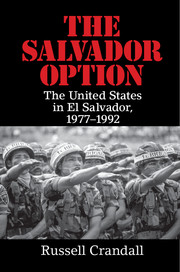Book contents
- Frontmatter
- Dedication
- Epigraph
- Contents
- List of Figures
- List of Organizations
- Acknowledgments
- 1 Introduction
- PART ONE EL SALVADOR IN THE COLD WAR
- PART TWO JIMMY CARTER
- PART THREE RONALD REAGAN
- 19 Reagan Arrives
- 20 Reagan and Salvador
- 21 El Mozote
- 22 Another Vietnam
- 23 Solidarity
- 24 Troop Cap and Certifying Human Rights
- 25 Reagan Gambles on Elections, 1982
- 26 The Shultz Doctrine
- 27 Human Rights
- 28 Henry Kissinger
- 29 Contras
- 30 “Elections Yes, Dialogue No,” 1984 Presidential Election
- 31 La Palma
- 32 Esquipulas
- 33 Counterinsurgency I
- 34 Counterinsurgency II
- 35 Zona Rosa
- 36 Air War
- 37 José Napoleón Duarte
- 38 Iran-Contra
- PART FOUR GEORGE H. W. BUSH
- PART FIVE POSTWAR
- Notes
- Bibliography
- Index
24 - Troop Cap and Certifying Human Rights
from PART THREE - RONALD REAGAN
Published online by Cambridge University Press: 05 June 2016
- Frontmatter
- Dedication
- Epigraph
- Contents
- List of Figures
- List of Organizations
- Acknowledgments
- 1 Introduction
- PART ONE EL SALVADOR IN THE COLD WAR
- PART TWO JIMMY CARTER
- PART THREE RONALD REAGAN
- 19 Reagan Arrives
- 20 Reagan and Salvador
- 21 El Mozote
- 22 Another Vietnam
- 23 Solidarity
- 24 Troop Cap and Certifying Human Rights
- 25 Reagan Gambles on Elections, 1982
- 26 The Shultz Doctrine
- 27 Human Rights
- 28 Henry Kissinger
- 29 Contras
- 30 “Elections Yes, Dialogue No,” 1984 Presidential Election
- 31 La Palma
- 32 Esquipulas
- 33 Counterinsurgency I
- 34 Counterinsurgency II
- 35 Zona Rosa
- 36 Air War
- 37 José Napoleón Duarte
- 38 Iran-Contra
- PART FOUR GEORGE H. W. BUSH
- PART FIVE POSTWAR
- Notes
- Bibliography
- Index
Summary
The militarizing of that region is warmongering, it's provocative and it's the wrong way to go.
– Reverend Jesse Jackson, civil rights leader and Democratic candidate in the 1984 presidential campaignYou can't fight Congress and public opinion and an enemy at the same time. That's why Vietnam was the crime of the century.
– Caspar Weinberger, Secretary of Defense, 1984For three and a half years an army of 22,000 has been outfought by a force of about 7,000 guerrillas. The advisers’ mission is to transform that army into a winning team, and to do it quickly.
– New York Times article on El Salvador, July 1983While he was ready and willing to assist the Duarte government and denounce the leftist guerrillas who sought to overthrow it, President Reagan downplayed the significance of the American commitment to El Salvador. In an interview with the Washington Post on March 27, 1981, he called the Salvadoran rebels “terrorists” who were part of a “revolution being exported to the Americas, to Central America and further south,” and in response to this threat the United States would “be of help to this [Salvadoran] government.” Yet Reagan added that the trainers were “in garrison, simply training recruits.” Once again this balance between hardline ideology and practice implementation entailed both a promise of U.S. commitment and restricted troop engagement. A few weeks earlier he had responded at length to explain why this troop deployment was so limited:
Now, you use the term “military advisers.” You know, there's sort of [a] technicality there. You could say they are advisers in that they're training, but when it's used as “adviser,” that means military men who go in and accompany the forces into combat, advise on strategy and tactics. We have no one of that kind. We're sending and have sent teams down there to train. They do not accompany them into combat.…And as a matter of fact, we have such training teams in more than 30 countries today, and we've always done that – the officers of the military in friendly countries and in our neighboring countries have come to our service schools – West Point, Annapolis, and so forth. So, I don't see any parallel at all.
- Type
- Chapter
- Information
- The Salvador OptionThe United States in El Salvador, 1977–1992, pp. 251 - 260Publisher: Cambridge University PressPrint publication year: 2016



